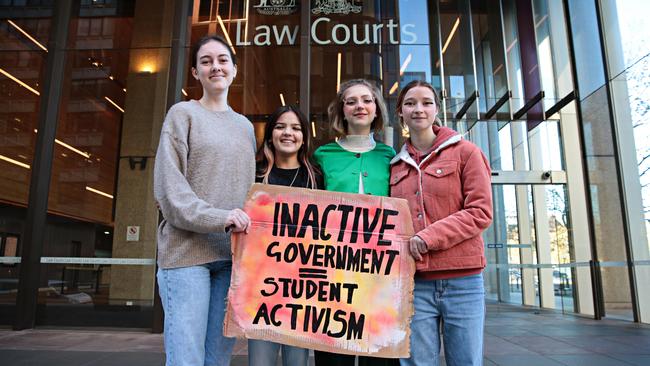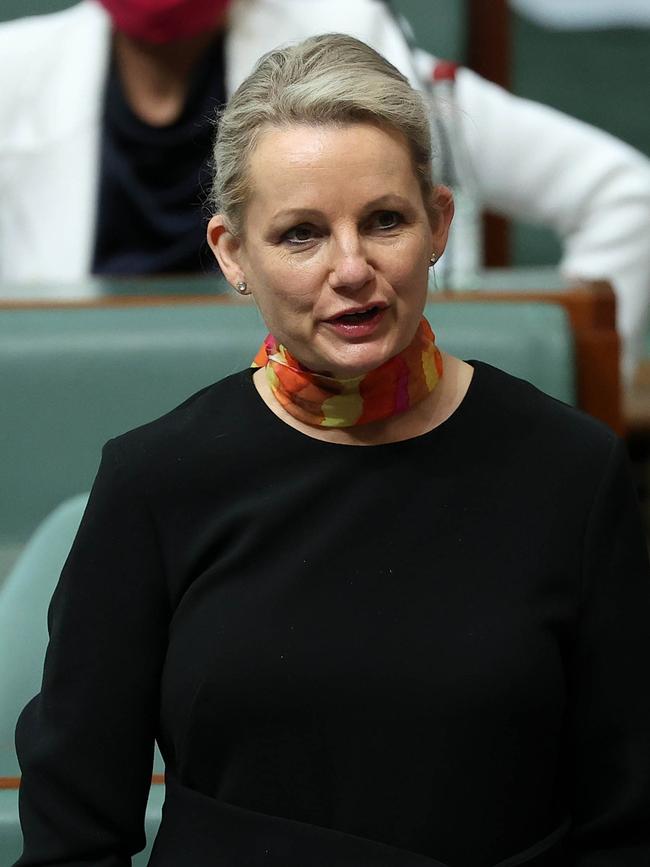Judges have no place in deciding climate policy
Environment Minister Sussan Ley is right to warn courts not to overstep their responsibilities, and true democrats will cheer her actions.

True democrats will cheer Ley’s actions. Whatever your views on climate change, policy in this area should be decided by our elected politicians, not unelected judges.
Those not cheering must have little interest in the proper workings of a healthy democracy. The charitable explanation is their emotion has blinded them to the dangers of activists using courts as tools in a global program of democratia interruptus.
First, some background. In May, Federal Court judge Mordecai Bromberg imposed a novel duty of care on the Minister in a class action brought by children who wanted an order to stop the extension project to Whitehaven Coal’s Vickery mine on the basis that it would add to emissions that cause catastrophic harm to the health of all children.
Bromberg obliged the kids, creating a new duty of care to have regard to the impact of Whitehaven’s extension project on the future health of children. Curiously, the judge shied away from injuncting the extension project. The result was sexy headlines about a judge creating a new duty on behalf of kids without the court taking responsibility for putting the kybosh on a mine.
It looked entirely weird, with Bromberg instead telling an elected politician to get back to him, an unelected judge, to show how she will apply his newly created duty of care. This week, Ley did that in spades. First, by getting on with her job politely unperturbed by Bromberg’s intervention. On Thursday morning, the Environment Minister announced her approval of Whitehaven’s extension project under sections 130 and 133 of the Environment Protection and Biodiversity Conservation Act. This decision follows her approval of an extension to coalmining at the Russel Vale Colliery in Wollongong on August 31.
In the Minister’s Statement of Reasons for the Whitehaven extension, Ley makes the point that this will not likely cause harm because if Australia doesn’t sell this additional coal to Japan, South Korea and Taiwan, other countries will. In other words, it’s business as usual in balancing complex environmental, economic and social costs.
But already law firms and climate activists are circling, hoping that confected emotion about saving little children will encourage judges, and the public, to ignore how a healthy democracy should work.

A few days earlier, Ley sent an even clearer missive to the Federal Court. She lodged her formal submission to appeal Bromberg’s decision with the Court on Monday. That submission cannot be accessed by the public until the hearing on October 18. The submission makes for riveting reading about the importance of the separation of powers in a democracy, and the overreach by some judges who seem confused about their place in our democracy.
If allowed to stand, Bromberg’s creative lawmaking would set a terrible precedent by allowing judges to overturn what parliament sets down as a decision-making process for ministers. And not just when it comes to climate change policy.
The submission reveals the natural frustrations of elected lawmakers when an unelected court up-ends a clear policy set down by parliament. It is packed with devastating logic that explains why judges have no business in politics and policymaking.
To better understand the context of this appeal, Ley’s submission says this in paragraph 1: “The Minister has never disputed in these proceedings that climate change presents real threats to Australia and Australians.” And this: “How to respond to anthropogenic climate change – the measures that should be taken to militate against it and ameliorate its effects, and how to manage the social and economic impacts of those measures – is one of the most complex and difficult policy questions that faces the commonwealth of Australia.”
Ley rejects Bromberg’s novel duty of care on the basis that “the result was to assert for the judiciary an unprecedented role in responding to the policy challenge posed by anthropogenic climate change, that being a role for which the judicial process is institutionally ill-suited”.
In other words, what possible policy expertise can a judge or a handful of judges draw on to determine a nation’s climate change policy? Unlike ministers and their vast departments that can draw on consultants and experts from across any field, and parliaments with their myriad committees, judges rely on the claims made by a plaintiff and a defendant. You may as well entrust an ABC journalist to draw up the nation’s climate change policy. It’s that scary.
If unelected judges meddle in climate change policy it undermines the ability of an elected government to govern. In a democracy, politicians and parliaments are entrusted to make policy for many sound reasons, not least of which is that they can be removed from office when they decide a policy that runs counter to the wishes of voters.
As the submission notes in paragraph 3: “No court in any common law jurisdiction has recognised a duty of care of the kind that the primary judge declared to exist. Indeed, no arguably analogous claim has succeeded in any common law jurisdiction.”
In other words, a judge’s role is to develop new law only if there is no alternative, and then only in small, cautious incremental steps, not in grand leaps of policymaking that amount to what the Americans call an end run around democracy.
The submission points out that “courts in other common law jurisdictions have determined that they are ‘incapable’ of, or ‘unsuited to’ dealing with claims against government involving action or inaction on climate change”.
This alludes to the fact that the class action brought before Bromberg in May is part of a global cookie-cutter campaign to get unelected judges to meddle in climate change policy making. None succeeded. Then they struck gold with Bromberg. It can’t have hurt that climate activists gathered a group of cute kids, shepherded by a nun named Sister Marie Brigid Arthur who acted as their “litigation representative”. The Brigidine sister sounds like a perfectly lovely nun, described in Wikipedia as “co-founder of the Brigidine Asylum Seekers Project, litigation guardian for children, public speaker and advocate for refugees”.
Putting aside this Disney-styled cast of plaintiffs, Ley’s submission rests on impeccable logic in rejecting Bromberg’s creation of a novel duty of care. For starters, there is a causation issue: the Environment Minister has little, if any, control over the risk to children of death or personal injury from heatwaves or bushfires that may be caused by climate change. Then there is the evidentiary flaw set out in this cracker criticism of Bromberg: “The primary judge had evident difficulty articulating on the facts how it was reasonably foreseeable that the act of granting approval for the Extension Project would cause CO2 emissions that were likely to cause personal injury to the Children.
“His Honour also stated that ‘the prospective contribution to the risk of exposure to harm made by the approval of the extraction of (this) coal … may fairly be described as tiny’ … Those findings should have been fatal to the respondents’ case.”
More critically, the submission sets out the basic legal flaw in Bromberg’s creation of a novel duty of care: the judge ignored the fact that federal parliament carefully prescribed a discretionary policymaking process in the EPBC Act and gave responsibility for exercising this discretion to the environment minister. “These two features ought to have been central to the primary judge’s assessment of whether a duty of care should be recognised. Instead, the first feature is dealt with abruptly and the second is barely considered,” the submission states.
Ley’s lawyers seem to have had some fun with this document. They reject as “inapt” Bromberg’s finding that the minister’s “statutory decision-making” powers under the EPBC Act are analogous to operational powers conferred on local councils. A less polite response might have pointed out Ley is not deciding whether green bins will be collected by garbos on Tuesdays or Fridays.
Parliament entrusts and empowers environment ministers to balance important policy considerations involving competing environment, social and economic impacts of the coalmine extension project in the interest of the entire Australian population, not just kids. That means protecting the environment, energy needs, jobs, the benefits of trade, the whole caboodle of interests that drive this country’s prosperity and future.
It is a serious attack on democracy when Australian courts become playgrounds for climate activists who bet on finding a judge who will impose a climate policy different from that agreed by voters. If judges can’t see that, we should be grateful to Ley for pointing that out to them.






This week, Environment Minister Sussan Ley sent a series of devastatingly clear messages to our most senior judges: Back off. You have no place trying to decide climate change policy.